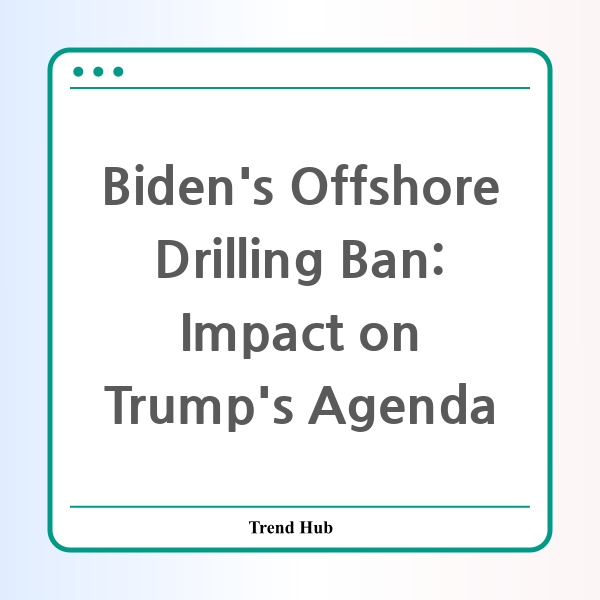* This website participates in the Amazon Affiliate Program and earns from qualifying purchases.

As President Biden implements a historic offshore drilling ban encompassing a staggering 625 million acres of U.S. coastal waters, the ramifications on the energy landscape are profound. This decisive move not only reflects Biden's commitment to environmental preservation but also sets the stage for a significant clash with the incoming Trump administration, who is keen on reversing such policies.
The executive action announced by President Biden aims to permanently prohibit new oil and gas development along vital coastlines, including the Atlantic, Pacific, and parts of the eastern Gulf of Mexico. This sweeping measure is designed to protect coastal communities, safeguard marine ecosystems, and diminish the risks of catastrophic oil spills that threaten both the environment and local economies.
Biden’s rationale is clear: “Drilling off these coasts could cause irreversible damage to places we hold dear and is unnecessary to meet our nation’s energy needs.” The executive order invokes the Outer Continental Shelf Lands Act of 1953, a law that grants the president expansive authority to withdraw federal waters from future leasing. However, it also raises questions about the boundaries of presidential powers. Can the new administration easily undo these protections? As it stands, the act does not explicitly allow for the reversal of such withdrawals without congressional intervention, making potential future changes by Trump more complex.
Trump’s immediate reaction to Biden’s announcement was one of defiance. He expressed intentions to “unban it immediately,” reflecting his administration's historical stance towards fossil fuel production. During his presidency, Trump himself had previously enacted bans on offshore drilling in specific regions, highlighting the paradox of his position. Despite a friendly approach to the oil and gas sector, he recognized the need to appease local sentiments in certain coastal states.
This conflict is not merely a battle of executive actions but also a reflection of broader ideological divides between environmental sustainability and energy independence. Supporters of the drilling ban argue that protecting coastal waters has bipartisan support, with governors and congressional members from both parties advocating for greater safeguards against offshore drilling. Indeed, environmental groups have heralded Biden's decision as a pivotal step towards combating climate change and promoting a sustainable economy.
However, the oil industry has voiced strong opposition to Biden's ban, labeling it as "significant and catastrophic." Industry leaders warn that such actions could stifle job creation and limit the U.S. energy portfolio at a time when energy prices continue to fluctuate. While Biden reassures that protecting the environment does not equate to sacrificing economic growth, analysts suggest that the impact on oil production may be minimal in the grand scheme of U.S. energy production.
As the political discourse unfolds, we witness an ever-evolving narrative regarding energy policy in America. The impending struggle represents more than just an energy debate; it symbolizes contrasting visions for the future of the nation’s natural resources. With Trump and his allies poised to challenge Biden’s decision through congressional means, the confrontation over offshore drilling serves as an illuminating case study in the complexities of governance and public policy.
In conclusion, Biden’s offshore drilling ban is a comprehensive strategy not only to mitigate climate change but to shift towards a more sustainable energy future. As we await Trump’s strategy to overturn this landmark policy, one thing is clear—the tension between environmental stewardship and fossil fuel dependency will continue to shape the political landscape of America for years to come.
* This website participates in the Amazon Affiliate Program and earns from qualifying purchases.